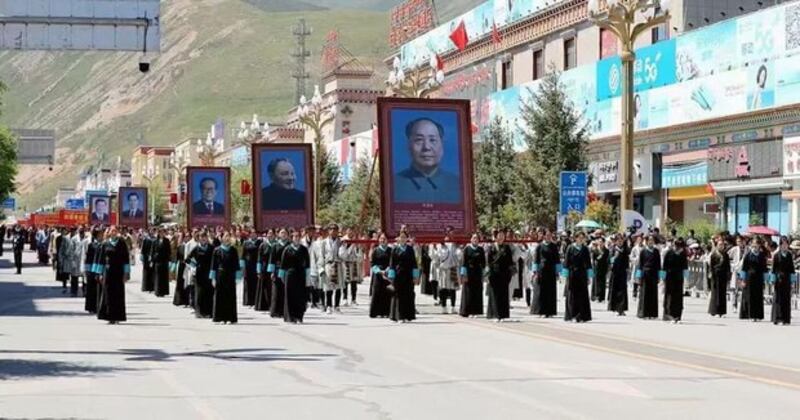A growing trend for extra-large public portraits of ruling Chinese Communist Party (CCP) general secretary Xi Jinping is a further indicator that China's leader will likely remain in office for a third term after the country's rubber-stamp parliament removed term limits from the job in March 2018.
During a recent ceremony in the Tibetan capital, Lhasa, marking the 70th anniversary of CCP rule there, a single, large portrait of Xi was displayed alongside another image showing five past leaders, as regional CCP secretary Wang Yang made a speech.
The arrangement was in stark contrast to a similar ceremony 10 years earlier marking the 60th anniversary of the People's Liberation Army (PLA)'s annexation of Tibet in 1951.
Xi, then vice-president, lauded the "wise decision-making and correct leadership" of his predecessors in a speech in Lhasa, mentioning late supreme leaders Mao Zedong and Deng Xiaoping, as well as former CCP general secretary and president Jiang Zemin. No portraits were displayed.
When Wang Yang stood up to speak on Aug. 19, 2021, however, he spoke only of Xi.
"We must adhere to the guidance of Xi Jinping Thought on Socialism with Chinese Characteristics for a New Era, and thoroughly study the spirit of General Secretary Xi Jinping's important speech at the Seventh Central Tibet Work Forum and the spirit of important instructions during inspections in Tibet," he told assembled dignitaries.
"Since the 18th CCP National Congress [when Xi took power], Tibet has entered its best new era," Wang said.
Hu Ping, the U.S.-based editor-in-chief of "Beijing Spring" magazine, said the prominence afforded to Xi at the ceremony told a story about Xi's grip on power within the party.
"The fact that Xi Jinping was given such fanfare and prominence ... and the praises heaped upon him since he took office show he is strengthening his position," Hu told RFA.
"This means that Xi Jinping will definitely be re-elected for [a third term in office] the 20th Party Congress next year," Hu said. "That's the message that's being sent."

'Xi Jinping Thought'
Large portraits of Xi have begun popping up alongside Mao portraits around China, as well as being prominently displayed in places of worship, and on the front pages of state media, amid a nationwide drive to encourage the study of Xi's personal brand of political ideology.
The CCP is working to bring "Xi Jinping Thought" into every aspect of public life, including as a research topic in universities, now that "Xi Jinping Thought on Socialism with Chinese Characteristics for a New Era" has been enshrined in the party constitution.
The propaganda department of the northern city of Taiyuan recently lauded local resident Guo Yanyun as a "Xi expert" after he memorized huge swathes of Xi's speeches.
Guo is said to have studied in her free time when not working for the Taiyuan Water Supply Co., and was at the top of the leaderboard on the Xi Jinping study app, Xuexi Qiangguo, scoring 41815 points as of June 15.
Current affairs commentator Guo Baosheng said the authorities had gamified political indoctrination, handing out badges to those who performed best.
"But it doesn't change what is happening here, which is brainwashing," Guo said. "Xi Jinping has set up a personality cult around him."
Ironically, the titles of honor on the app's leaderboard are originally from Japan, according to Yang Haiying, a professor at Japan's Shizuoka University.
"The words used for master or expert are found in Japanese, but this vocabulary doesn't exist in Chinese," Yang said. "They used to call them models, as in Lei Feng, the model worker."
Tibetans are disappointed with Xi
"If Xi is now setting up model learners or model anything ... it is a throwback to the Cultural Revolution," he said, in a reference to the the decade of political violence and social turmoil from 1966-1976 under late supreme leader Mao Zedong.
"Chinese culture and society south of the Great Wall ... have been historically all too willing to accept dictatorship," Yang said, citing strong resistance to Beijing's rule in Tibet, Xinjiang and other areas claimed by the CCP.
Tsultrim Gyatso, Chinese Liaison Officer at the Dalai Lama's Office of Tibet in Washington, said Tibetans were disappointed with Xi's performance on Tibet.
"When he first became president of the country, the Tibetans had high hopes for him, because his father Xi Zhongxun was a Chinese official who understood Tibetan Buddhism," Tsultrim Gyatso said.
"They didn't think that Chinese policies in Tibet would become even more repressive over the next 10 years."
He said Wang Yang also went out of his way to criticize the Dalai Lama at the ceremony, as well as "hostile foreign forces" for allegedly "engaging in separatist and sabotage activities."
"The real separatists are the Chinese government," Tsultrim Gyatso said. "If they hadn't implemented such oppressive policies in Tibet, the Tibetans wouldn't have protested time and again."
Translated and edited by Luisetta Mudie.
